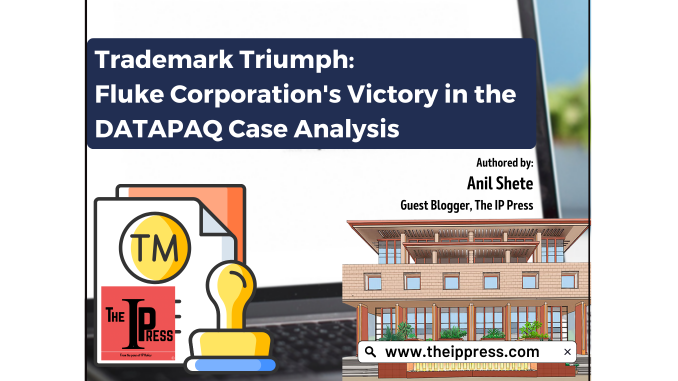

Case Name: Fluke Corporation vs. Registrar of Trademarks
Case Citation: C.A.(COMM.IPD-TM) 47/2022, MANU/DE/5367/2023
Date of Decision: 16th August, 2023
CORAM: JUSTICE PRATHIBA M. SINGH
Introduction
In the case of Fluke Corporation vs. Registrar of Trademarks, the Appellant filed an appeal against the order of the Respondent at the Delhi High Court to set aside the impugned order, challenging the rejection of their trademark application for the mark ‘DATAPAQ’ under Section 9(1)(b) of the Trade Marks Act, 1999. The primary ground for rejection was that the mark was deemed descriptive of the goods and services.
Procedural History
The appellant’s Trademark Application No. 2354325, filed on 26th June 2012 for the mark ‘DATAPAQ’ in Class 09 i.e. “Scientific, nautical, surveying, electric, photographic, cinematographic, optical, weighing, measuring, signalling, checking (supervision), lifesaving and teaching apparatus and instruments; apparatus for recording, transmission or reproduction of sound or images; magnetic data carriers, recording discs; automatic vending machines and mechanisms for coin-operated apparatus; cash registers, calculating machines, data processing equipment and computers; fire extinguishing apparatus”, was rejected by the Respondent-Registrar of Trademarks through an order dated 10th December 2018 under Section 9(1)(b) of the Trade Marks Act, 1999.The relevant extract of the order is produced herein below:


During the course of the proceedings, the appellant expressed willingness to restrict the use of the mark ‘DATAPAQ’ to certain goods related to temperature systems and temperature profiling. An amended description of goods was submitted by the appellant, effectively removing three descriptions namely • Electronic data logger sensors, • Thermocouple trays and • Electronic data loggers from the original application.
Issue Presented
The primary issue in this case is whether the mark ‘DATAPAQ’ is descriptive of the goods and services for which it was filed.
Rule of Law
The Trade Marks Act, 1999, specifically Section 9(1)(b), states that trademarks that are descriptive of the goods or services for which they are filed should be refused registration unless they have acquired secondary meaning.
Contentions of the Appellant
The appellant, Fluke Corporation, argued that the mark ‘DATAPAQ’ is not descriptive and should be eligible for trademark protection. They pointed out that they have been using this mark since 1985 and have registered it in various countries, including the USA. They also highlighted their use of similar marks ending with ‘PAQ,’ such as COILPAQ, WICKETPAQ, MONOPAQ, and others, as part of a series.
Contentions of the Respondent
The Registrar of Trademarks contended that the mark ‘DATAPAQ’ is descriptive and should be rejected under Section 9(1)(b) of the Trade Marks Act, 1999. The Registrar’s reasoning was succinct, stating that the trademark is descriptive, and therefore the objection under Section 9 is maintained.
Analysis and Reasoning
In analyzing the case, the court first considered the nature of the mark ‘DATAPAQ’ and the goods and services it represents. The court noted that the mark was being used for temperature monitoring and temperature profiling software systems. Additionally, the appellant had registered other marks ending with ‘PAQ’ as part of a series.
The court referred to previous decisions, such as Bata India Ltd. v. Chawla Boot House[1], which held that even if a mark contains elements that could be descriptive, the overall distinctiveness of the mark and the extent of its usage should be considered. The court also cited Disruptive Health Solutions v. Registrar of Trade Marks[2], which emphasized that descriptive marks can be registered if secondary meaning is established.
In this case, the court found that the Registrar’s objection based on descriptiveness was unsustainable because it did not consider whether the mark ‘DATAPAQ’ had acquired secondary meaning. The court took into account the appellant’s extensive use of the mark and its registrations in multiple countries.
Holding and Decision
The court ruled in favor of the appellant, Fluke Corporation. The mark ‘DATAPAQ’ was allowed to proceed for advertisement in the trademark journal with the following conditions:
- No exclusivity shall vest in the words ‘DATA’ or ‘PACK/PAQ’ separately.
- The trademark registration shall be confined to the word mark DATAPAQ as a whole.
The court clarified that this order would not affect any opposition proceedings that might be filed against the appellant’s mark.
Implications and Significance
This case underscores the importance of considering the distinctiveness and extent of usage when evaluating trademark applications. Descriptive marks may still be eligible for registration if they have acquired secondary meaning through use and recognition in the market. The decision in this case provides clarity on the registration of marks with descriptive elements and emphasizes the need for a thorough examination of the circumstances surrounding each application.
Conclusion
The Fluke Corporation vs. Registrar of Trademarks case serves as a valuable precedent in trademark law, reaffirming the principle that descriptive marks can be registered if they have acquired secondary meaning. The court’s decision highlights the importance of considering the overall distinctiveness and extensive use of a mark when determining its eligibility for trademark protection. This case analysis provides a comprehensive overview of the legal proceedings and reasoning that led to the favorable outcome for the appellant, Fluke Corporation.
[1] CS (COMM) 110/2019, decision dated 16th April 2019
[2] C.A. (COMM.IPD-TM) 133/2022, decision dated 8th July 2022.
- SEO Powered Content & PR Distribution. Get Amplified Today.
- PlatoData.Network Vertical Generative Ai. Empower Yourself. Access Here.
- PlatoAiStream. Web3 Intelligence. Knowledge Amplified. Access Here.
- PlatoESG. Carbon, CleanTech, Energy, Environment, Solar, Waste Management. Access Here.
- PlatoHealth. Biotech and Clinical Trials Intelligence. Access Here.
- Source: https://www.theippress.com/2023/11/09/trademark-triumph-fluke-corporations-victory-in-the-datapaq-case-analysis/



